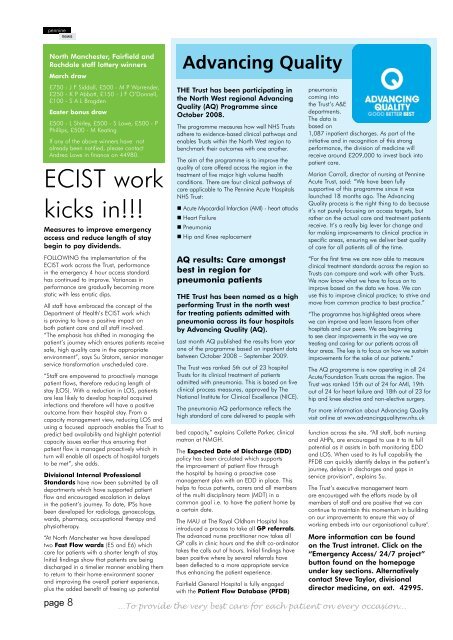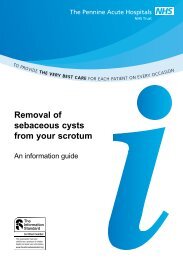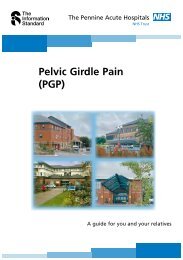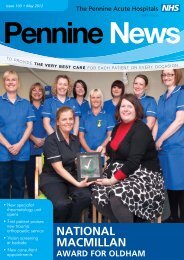Pennine News 83 - June 2010 - Pennine Acute Hospitals NHS Trust
Pennine News 83 - June 2010 - Pennine Acute Hospitals NHS Trust
Pennine News 83 - June 2010 - Pennine Acute Hospitals NHS Trust
Create successful ePaper yourself
Turn your PDF publications into a flip-book with our unique Google optimized e-Paper software.
pennine<br />
news<br />
north Manchester, fairfield and<br />
rochdale staff lottery winners<br />
March draw<br />
£750 - J F Siddall, £500 - M P Warrender,<br />
£ 50 - K P Abbott, £150 - J F O’Donnell,<br />
£100 - S A L Brogden<br />
Easter bonus draw<br />
£500 - L Shirley, £500 - S Lowe, £500 - P<br />
Phillips, £500 - M Keating<br />
If any of the above winners have not<br />
already been notified, please contact<br />
Andrea Lowe in finance on 44980.<br />
ECIST work<br />
kicks in!!!<br />
Measures to improve emergency<br />
access and reduce length of stay<br />
begin to pay dividends.<br />
FOLLOWING the implementation of the<br />
ECIST work across the <strong>Trust</strong>, performance<br />
in the emergency 4 hour access standard<br />
has continued to improve. Variances in<br />
performance are gradually becoming more<br />
static with less erratic dips.<br />
All staff have embraced the concept of the<br />
Department of Health’s ECIST work which<br />
is proving to have a positive impact on<br />
both patient care and all staff involved.<br />
“The emphasis has shifted in managing the<br />
patient’s journey which ensures patients receive<br />
safe, high quality care in the appropriate<br />
environment”, says Su Statom, senior manager<br />
service transformation unscheduled care.<br />
“Staff are empowered to proactively manage<br />
patient flows, therefore reducing length of<br />
stay (LOS). With a reduction in LOS, patients<br />
are less likely to develop hospital acquired<br />
infections and therefore will have a positive<br />
outcome from their hospital stay. From a<br />
capacity management view, reducing LOS and<br />
using a focused approach enables the <strong>Trust</strong> to<br />
predict bed availability and highlight potential<br />
capacity issues earlier thus ensuring that<br />
patient flow is managed proactively which in<br />
turn will enable all aspects of hospital targets<br />
to be met”, she adds.<br />
Divisional Internal Professional<br />
Standards have now been submitted by all<br />
departments which have supported patient<br />
flow and encouraged escalation in delays<br />
in the patient’s journey. To date, IPSs have<br />
been developed for radiology, gynaecology,<br />
wards, pharmacy, occupational therapy and<br />
physiotherapy.<br />
“At North Manchester we have developed<br />
two Fast Flow wards (E5 and E6) which<br />
care for patients with a shorter length of stay.<br />
Initial findings show that patients are being<br />
discharged in a timelier manner enabling them<br />
to return to their home environment sooner<br />
and improving the overall patient experience,<br />
plus the added benefit of freeing up potential<br />
Advancing Quality<br />
THe <strong>Trust</strong> has been participating in<br />
the north West regional advancing<br />
Quality (aQ) Programme since<br />
October 2008.<br />
The programme measures how well <strong>NHS</strong> <strong>Trust</strong>s<br />
adhere to evidence-based clinical pathways and<br />
enables <strong>Trust</strong>s within the North West region to<br />
benchmark their outcomes with one another.<br />
The aim of the programme is to improve the<br />
quality of care offered across the region in the<br />
treatment of five major high volume health<br />
conditions. There are four clinical pathways of<br />
care applicable to The <strong>Pennine</strong> <strong>Acute</strong> <strong>Hospitals</strong><br />
<strong>NHS</strong> <strong>Trust</strong>:<br />
� <strong>Acute</strong> Myocardial Infarction (AMI) - heart attacks<br />
� Heart Failure<br />
� Pneumonia<br />
� Hip and Knee replacement<br />
AQ results: Care amongst<br />
best in region for<br />
pneumonia patients<br />
THe <strong>Trust</strong> has been named as a high<br />
performing <strong>Trust</strong> in the north west<br />
for treating patients admitted with<br />
pneumonia across its four hospitals<br />
by advancing Quality (aQ).<br />
Last month AQ published the results from year<br />
one of the programme based on inpatient data<br />
between October 008 – September 009.<br />
The <strong>Trust</strong> was ranked 5th out of 3 hospital<br />
<strong>Trust</strong>s for its clinical treatment of patients<br />
admitted with pneumonia. This is based on five<br />
clinical process measures, approved by The<br />
National Institute for Clinical Excellence (NICE).<br />
The pneumonia AQ performance reflects the<br />
high standard of care delivered to people with<br />
bed capacity,” explains Collette Parker, clinical<br />
matron at NMGH.<br />
The Expected Date of Discharge (EDD)<br />
policy has been circulated which supports<br />
the improvement of patient flow through<br />
the hospital by having a proactive case<br />
management plan with an EDD in place. This<br />
helps to focus patients, carers and all members<br />
of the multi disciplinary team (MDT) in a<br />
common goal i.e. to have the patient home by<br />
a certain date.<br />
The MAU at The Royal Oldham Hospital has<br />
introduced a process to take all GP referrals.<br />
The advanced nurse practitioner now takes all<br />
GP calls in clinic hours and the shift co-ordinator<br />
takes the calls out of hours. Initial findings have<br />
been positive where by several referrals have<br />
been deflected to a more appropriate service<br />
thus enhancing the patient experience.<br />
Fairfield General Hospital is fully engaged<br />
with the Patient Flow Database (PFDB)<br />
pneumonia<br />
coming into<br />
the <strong>Trust</strong>’s A&E<br />
departments.<br />
The data is<br />
based on<br />
1,087 inpatient discharges. As part of the<br />
initiative and in recognition of this strong<br />
performance, the division of medicine will<br />
receive around £ 09,000 to invest back into<br />
patient care.<br />
Marian Carroll, director of nursing at <strong>Pennine</strong><br />
<strong>Acute</strong> <strong>Trust</strong>, said: “We have been fully<br />
supportive of this programme since it was<br />
launched 18 months ago. The Advancing<br />
Quality process is the right thing to do because<br />
it’s not purely focusing on access targets, but<br />
rather on the actual care and treatment patients<br />
receive. It’s a really big lever for change and<br />
for making improvements to clinical practice in<br />
specific areas, ensuring we deliver best quality<br />
of care for all patients all of the time.<br />
“For the first time we are now able to measure<br />
clinical treatment standards across the region so<br />
<strong>Trust</strong>s can compare and work with other <strong>Trust</strong>s.<br />
We now know what we have to focus on to<br />
improve based on the data we have. We can<br />
use this to improve clinical practice; to strive and<br />
move from common practice to best practice.”<br />
“The programme has highlighted areas where<br />
we can improve and learn lessons from other<br />
hospitals and our peers. We are beginning<br />
to see clear improvements in the way we are<br />
treating and caring for our patients across all<br />
four areas. The key is to focus on how we sustain<br />
improvements for the sake of our patients.”<br />
The AQ programme is now operating in all 4<br />
<strong>Acute</strong>/Foundation <strong>Trust</strong>s across the region. The<br />
<strong>Trust</strong> was ranked 15th out of 4 for AMI, 19th<br />
out of 4 for heart failure and 18th out of 3 for<br />
hip and knee elective and non-elective surgery.<br />
For more information about Advancing Quality<br />
visit online at www.advancingqualitynw.nhs.uk<br />
function across the site. “All staff, both nursing<br />
and AHPs, are encouraged to use it to its full<br />
potential as it assists in both monitoring EDD<br />
and LOS. When used to its full capability the<br />
PFDB can quickly identify delays in the patient’s<br />
journey, delays in discharges and gaps in<br />
service provision”, explains Su.<br />
The <strong>Trust</strong>’s executive management team<br />
are encouraged with the efforts made by all<br />
members of staff and are positive that we can<br />
continue to maintain this momentum in building<br />
on our improvements to ensure this way of<br />
working embeds into our organisational culture".<br />
More information can be found<br />
on the <strong>Trust</strong> intranet. click on the<br />
“emergency access/ 24/7 project”<br />
button found on the homepage<br />
under key sections. alternatively<br />
contact Steve Taylor, divisional<br />
director medicine, on ext. 42995.<br />
page 8 …To provide the very best care for each patient on every occasion…







